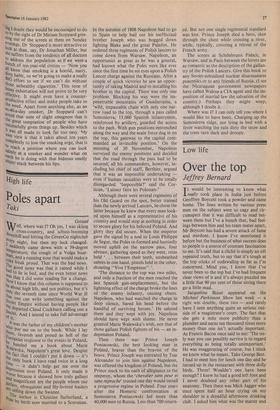High life
Poles apart
Taki
Gstaad W
ell, where was I? Oh yes, I was skiing
cross-country, and schuss-booming downhill and hitting the GreenGo nightclub ervery night, but then my luck change egd. suddenly came down with a 39-dree temperature, the cough of a Volga boat- Than, and a running nose that would make a coke freak proud. That was the bad news. the good news was that it rained while I had to lie in bed, and the even better news ivNas that 1 did some reading for a change. °W I know that this column is supposed to e about high life, and not politics, but it's only the seventh time since World War II t' r°t one can write something against the t Viet Empire without having people like
departed Claud Cockburn calling one a fascist. And I intend to take full advantage of it.
It was the father of my children's mother her put me on to the book. While I lay e, feverish and proud as hell of the
her response to the events in Poland, \i handed me a book about Marie nleska Napoleon's great love. Despite the fact that I couldn't put it down — it's the Only book I have read twice in a long de — it didn't help get me over the 'Pression over Poland. It only made it n°"se because it showed how truly gallant magnificent are the people whom our g,litless, obsequious and lily-livered leaders "te selling down the Swanee.
P The author is Christine Sutherland, a le by birth now married to a Scotsman. In the autumn of 1808 Napoleon had to go to Spain to help bail out his ineffectual brother Joseph who was bogged down fighting Blake and the great Palafox. He ordered three regiments of Polish lancers to come down from Warsaw. Napoleon, an opportunist as great as he was a general, had known what the Poles were like ever since the first time he set eyes upon a Polish Lancer charge against the Russians. After a couple of quick victories he saw an oppor- tunity of taking Madrid and re-installing his brother in the capital. There was only one problem. Blocking his way were the im- penetrable mountains of Guadarrama, a `wild, impassable chain with only one nar- row road to the top, through a pass called Somosierra; 13,000 Spanish infantrymen, reinforced by artillery, guarded the access to the path. With gun positions entrenched along the way and the main force dug in on the top, this gateway to the capital com- manded an invincible position.' On the morning of 30 November, Napoleon surveyed the enemy positions and decided that the road through the pass had to be secured; all his commanders, however, in- cluding his chief of staff, Berthier, argued that it was an impossible undertaking — even if human casualties were to be totally disregarded. 'Impossible?' said the Cor- sican, `Laissez faire les Polonais.'
Although there were several regiments of his Old Guard on the spot, better trained than the newly arrived Lancers, he chose the latter because he knew that every man look- ed upon himself as a representative of his country and would stop at nothing in order to secure glory for his beloved Poland. And glory they did secure. When the emperor gave the signal by a nod to Louis Philippe de Segur, the Poles re-formed and hurriedly moved uphill on the narrow pass, four abreast, gathering speed as they went, reins held `. . between their teeth, unsheathed sabres in one hand, pistols held in the other, shouting "Vive l'Empereur" `The distance to the top was two miles, and only a fraction of the men reached the last Spanish gun-emplacements, but the lightning effect of the charge broke the lines of the enemy infantry, causing chaos. Napoleon, who had watched the charge in deep silence, bared his head before the handful of surviving heroes.' He saluted them and they wept with joy. Napoleon should have wept with shame. He never granted Marie Walewska's wish, nor that of those gallant Polish fighters of his — an in- dependent Poland.
Then there was Prince Joseph Poniatowski, the best looking man in Poland, braver than the bravest of the brave. Prince Joseph was entreated by Tsar Alexander to join him against Napoleon, was offered the kingdom of Poland, but the Prince stuck to his oath of allegiance to the emperor, whom the 'chevalier sans peur et sans reproche' trusted one day would install a progressive regime in Poland. Four years after the Homeric confrontation at Somosierra Poniatowski led more than 40,000 men to Russia. Less than 700 return-
ed. But not one single regimental standard was lost. Prince Joseph died a hero, shot through the chest while crossing a river, while, typically, covering a retreat of the French army.
The scenes at SchOnbrunn Palace, in Warsaw, and in Paris between the lovers are as romantic as the description of the gallan- try of the Polish Lancers. Give this book to any Soviet-subsidised nuclear disarmament peaceniks or to any friends of Russia. (I see the Nicaraguan government newspapers have called Walesa a CIA agent and the im- position of martial law the salvation of the country.) Perhaps they might weep, although I doubt it.
Where was I? I can only tell you where I would like to have been. Charging up the Somosierra ridge, not lying in bed with a fever watching the rain dirty the snow and the trees turn dark and droopy.


































 Previous page
Previous page